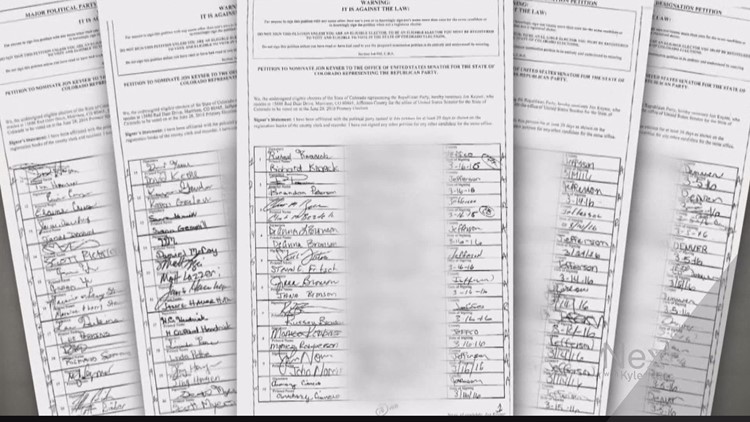DENVER — Collecting signatures in Colorado to qualify for an election ballot has had quite a few challenges.
Walker Stapleton, Republican candidate for Governor, just asked the Secretary of State to toss the signatures he turned in to qualify for the ballot because he said the firm he hired to collect the signatures lied to him and he can no longer trust the authenticity of what he turned in.
Voters in Colorado Springs just sued to try to keep six-term Congressman Doug Lamborn from qualifying for the ballot for a seventh term, arguing that seven of the people who collected signatures for him were not really Colorado residents, which is required by state law.
A judge determined that six of the seven did meet residency requirements and Lamborn is staying on the ballot, though those voters are appealing to the state Supreme Court.
And now, the Secretary of State is being challenged for not allowing unaffiliated voters to sign petitions for affiliated candidates. Colorado law requires petitions to be signed by voters who are of the same party as the person they're supporting. Democrats sign for Democrats, Republicans sign for Republicans.
And in 2016, a signature collector for a U.S. Senate candidate was arrested and pleaded guilty to forging signatures.
Yet, collecting signatures is one of the ways to get on the ballot in Colorado. Going through a party's caucus or assembly process is another.
"We want people to actually demonstrate a showing of support from Coloradans," said Secretary of State Wayne Williams, R-Colorado. "I don't think signature collection is done."
During Presidential years, Colorado allows anyone to pay a $1,000 fee, payable to the Colorado Department of State, to secure a spot on Colorado's ballot. However, that fee doesn't get those candidates on the ballot in any other state.
"We had 21 different people running for President on the last ballot," said Williams.
Candidates cannot pay a fee to qualify for the ballot when running for State House, Governor or Congress.
"For many of the races it becomes a name ID contest, and a name ID contest either rewards celebrities or people who are rich and can buy the name ID as opposed to grassroots candidates," said Williams.
Think about the 2003 recall election in California. Gov. Gray Davis, D-Calif., was recalled and 135 candidates were on the ballot to replace him.
From child actor Gary Coleman, to Hustler's Larry Flynt and former porn star Mary Carey. The election was ultimately won by actor Arnold Schwarzenegger.
"Colorado's system already encourages wealthy people and discourages folks who don't have vast personal resources from running for office," said Williams. "And you see that in a number of the candidates this time who have the money to contribute to their own campaigns. That would be exacerbated when you have a system that says, 'pay to play.'"
In Florida, candidates can collect signatures or pay a fee. From $1,781.82 for State House to $10,440 for Congress.
In Tennessee, you only need to turn in 25 signatures to run for office. If you want to run for president, you have to turn in 275.
In Mississippi, the fee ranges from $10 for mayor to $1,000 for governor and $2,500 for president. If you're an unaffiliated candidate, you have to pay those fees and turn in 1,000 signatures.
In Colorado, unaffiliated voters make up the majority of the electorate.
As of April 1, Colorado's voter makeup is as follows:
- Unaffiliated: 1,184,408 voters (36 percent)
- Democrat: 1,012,125 voters (31 percent)
- Republican: 1,000,229 voters (30 percent)
Unaffiliated voters can still qualify for the general election ballot in November by collecting signatures between May 17 and July 12.
Candidates can also file the paperwork to be a write-in candidate, but their names won't appear on the ballot.



